Related Research Articles
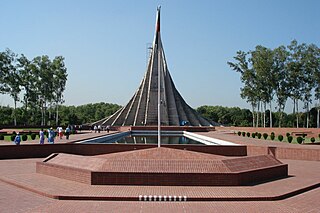
Savar is an Upazila of Dhaka District in the Division of Dhaka, Bangladesh and is located at a distance of about 24 kilometers (15 mi) to the northwest of Dhaka city. Savar is mostly famous for the National Martyrs' Memorial, the national monument for the martyrs of the Liberation War of Bangladesh.
Hannan Majid is a British documentary filmmaker.

The textile and clothing industries provide a single source of growth in Bangladesh's rapidly developing economy. Exports of textiles and garments are the principal source of foreign exchange earnings. By 2002 exports of textiles, clothing, and ready-made garments (RMG) accounted for 77% of Bangladesh's total merchandise exports. Emerging as the world's second-largest exporter of ready-made garment (RMG) products, Bangladesh significantly bolstered employment within the manufacturing sector.
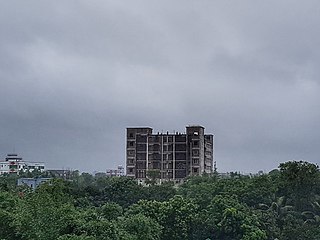
The 2012 Dhaka garment factory fire broke out on 24 November 2012, in the Tazreen Fashion factory in the Ashulia district on the outskirts of Dhaka, Bangladesh. At least 117 people were confirmed dead in the fire, and over 200 were injured, making it the deadliest factory fire in the nation's history. The fire was initially presumed to be caused by an electrical short circuit, but Prime Minister Sheikh Hasina has since suspected that the fire had been arson and an act of "sabotage" due to the occurrence of previous comparable events. This event and others similar to it have led to numerous proposed reforms in workers' rights and safety laws in Bangladesh.

The Rana Plaza collapse was a structural failure that occurred on 24 April 2013 in the Savar Upazila of Dhaka District, Bangladesh, where an eight-story commercial building called Rana Plaza collapsed. The search for the dead ended on 13 May 2013 with a death toll of 1,134. Approximately 2,500 injured people were rescued from the building. It is considered the deadliest accidental structural failure in modern human history, the deadliest garment-factory disaster in history and the deadliest industrial accident in the history of Bangladesh.
Mohammad Sohel Rana is the owner of Rana Plaza which collapsed in Savar, a sub-district near Dhaka, the capital of Bangladesh. He is a Jubo League leader of Bangladesh Awami League.
Clothing industry or garment industry summarizes the types of trade and industry along the production and value chain of clothing and garments, starting with the textile industry, embellishment using embroidery, via the fashion industry to apparel retailers up to trade with second-hand clothes and textile recycling. The producing sectors build upon a wealth of clothing technology some of which, like the loom, the cotton gin, and the sewing machine heralded industrialization not only of the previous textile manufacturing practices. Clothing industries are also known as allied industries, fashion industries, garment industries, or soft goods industries.
The Alliance for Bangladesh Worker Safety, also known as "the Alliance" or AFBWS, is a group of 28 major global retailers formed to develop and launch the Bangladesh Worker Safety Initiative, a binding, five-year undertaking with the intent of improving safety in Bangladeshi ready-made garment (RMG) factories after the 2013 Rana Plaza building collapse. Collectively, Alliance members represent the majority of North American imports of ready-made garments from Bangladesh, produced in more than 700 factories.
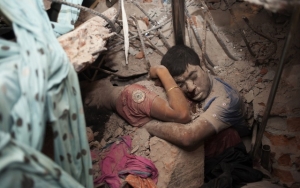
Final Embrace is a photograph showing two victims in the rubble of the April 2013 collapse of the eight storey Rana Plaza building in Savar Upazila, Bangladesh. The photograph, taken by freelance photographer Taslima Akhter, was awarded third prize in the World Press Photo (single) in the "spot news category". It was also selected among Time magazine's "Top 10 Photos of 2013".
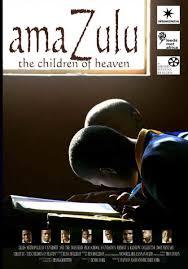
AmaZulu: The Children of Heaven is a 2006 British documentary film directed by Hannan Majid and Richard York. The film follows seven teenagers in a township in Umlazi as they come together to learn under the leadership of headmaster, Mr. Mtshali at Velabahleke High School.
Bafana is a 2006 British documentary film directed by Hannan Majid and Richard York. The film looks at the life and experiences of Cape Town's street children.

The Machinists is a 2012 British documentary film directed by Hannan Majid and Richard York. The film documents the exploitation of garment workers in Bangladesh with the personal stories of three young women working in factories in Dhaka.

Mass E Bhat is a 2014 British documentary film directed by Hannan Majid and Richard York. The film weaves together the stories of children living and working in Bangladesh.
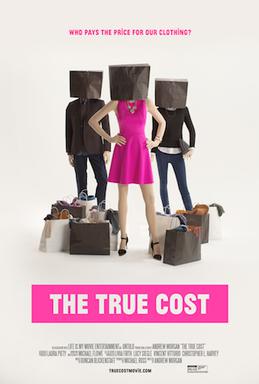
The True Cost is a 2015 documentary film directed by Andrew Morgan that focuses on fast fashion. It discusses several aspects of the garment industry from production—mainly exploring the life of low-wage workers in developing countries—to its after-effects such as river and soil pollution, pesticide contamination, disease and death. Using an approach that looks at environmental, social and psychological aspects, it also examines consumerism and mass media, ultimately linking them to global capitalism. The documentary is a collage of several interviews with environmentalists, garment workers, factory owners, and people organizing fair trade companies or promoting sustainable clothing production.
The Bangladesh Film Censor Board is a regulatory agency that is responsible for the censorship of movies and is located in Dhaka, Bangladesh.
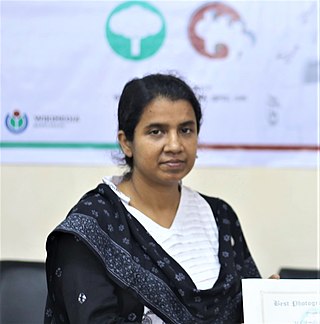
Taslima Akhter is a Bangladeshi activist and photographer. She is a graduate of Dhaka University, as well as the photography school Pathshala. She is a member of several activist organizations. While documenting the Rana Plaza collapse in 2013, she took a photograph of a woman and a man who had died in each other's arms, which became emblematic of the incident.
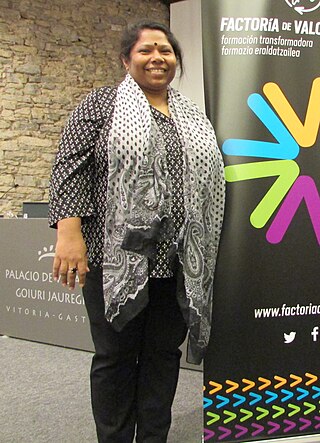
Kalpona Akter is a labour activist from Bangladesh. She is the founder and executive director of the Bangladesh Center for Workers Solidarity and was awarded Human Rights Watch's Alison Des Forges award for Extraordinary Activism in 2016.
The Garment Workers Unity Forum (GWUF) is a national trade union federation of garment workers in Bangladesh.
The National Garment Workers Federation (NGWF) is a registered national trade union federation of garment workers in Bangladesh. With 87 registered factory unions, it ifs considered one of the four main federations of garment workers' unions. NGWF is the initiator and a member of the Bangladesh Garments Workers Unity Council and a member of the Bangladesh Center for Workers' Solidarity. It is affiliated with the IndustriALL Global Union and one of the signatories of the Bangladesh Accord.
The 2023 Bangladesh garments workers strike is a labor dispute between Bangladesh Garment and Industrial Workers Federation and Bangladesh Garment industry, principally over wages. The strike is currently ongoing.
References
- ↑ "Tears In The Fabric". Rainbow Collective. Retrieved 1 February 2015.
- 1 2 McVeigh, Tracy (19 April 2014). "Ethical lobby to target fashion retailers with supply chain campaign". The Observer . Retrieved 1 February 2015.
- ↑ Kearns, Morwenna (13 April 2014). "Raising for Rana: marking the anniversary of Rana Plaza". Blue and Green Tomorrow. Retrieved 1 February 2015.
- ↑ Gregory, Danielle (25 April 2014). "Raising for Rana: interview with Rainbow Collective". Green Glitter. Retrieved 1 February 2015.
- ↑ "The Story of Bangladesh and Bangladeshi People". The Historical Association. 14 May 2014. Retrieved 1 February 2015.
- ↑ "Tears In The Fabric – a documentary film by The Rainbow Collective". The Gandi Foundation. 19 May 2014. Retrieved 1 February 2015.
- ↑ Badal, Julie Flynn (28 April 2014). "Revisiting Rana Plaza". The Huffington Post . Retrieved 1 February 2015.
- ↑ "Films For Food". Films For Food. Retrieved 1 February 2015. Tears in the Fabric
- ↑ "Festival Awards 2014". Workers Unite Film Festival. Retrieved 1 February 2015.